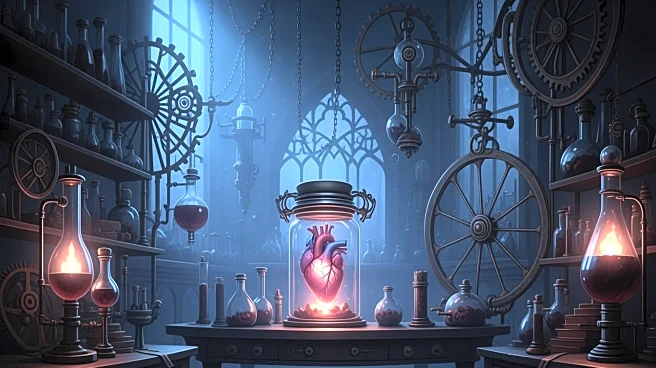What's Happening?
Guillermo del Toro's adaptation of Mary Shelley's 'Frankenstein' is set to stream on Netflix starting November 7. The film stars Oscar Isaac as Victor Frankenstein and Jacob Elordi as the Creature. Del
Toro's version of the classic tale delves into themes of fatherhood and forgiveness, drawing parallels between the story and his personal experiences. The film portrays Victor Frankenstein as a scientist driven by the loss of his mother to conquer death, leading to the creation of the Creature. The narrative explores the complex relationship between Victor and his creation, reflecting cycles of trauma and the quest for understanding and forgiveness.
Why It's Important?
The film's exploration of father-son dynamics and forgiveness resonates with broader societal themes of familial relationships and personal growth. Del Toro's personal experiences, including his father's kidnapping and subsequent death, add depth to the narrative, offering viewers a poignant reflection on acceptance and reconciliation. The movie's release on Netflix provides a platform for these themes to reach a wide audience, potentially sparking conversations about the impact of family dynamics on personal development and the importance of forgiveness in healing past wounds.
What's Next?
As 'Frankenstein' becomes available on Netflix, it is likely to attract attention from both fans of del Toro's work and those interested in classic literature adaptations. The film may inspire discussions on the portrayal of complex emotional themes in horror genres and the role of streaming platforms in bringing such narratives to a global audience. Additionally, the film's release could influence future adaptations of classic novels, encouraging filmmakers to explore deeper emotional and psychological themes.
Beyond the Headlines
Del Toro's 'Frankenstein' not only revisits a classic tale but also challenges viewers to consider the ethical implications of scientific advancements and the human desire to overcome mortality. The film's focus on forgiveness and acceptance may prompt audiences to reflect on their own familial relationships and the importance of understanding and empathy in resolving conflicts. This adaptation could contribute to a broader cultural dialogue about the intersection of science, ethics, and personal growth.









